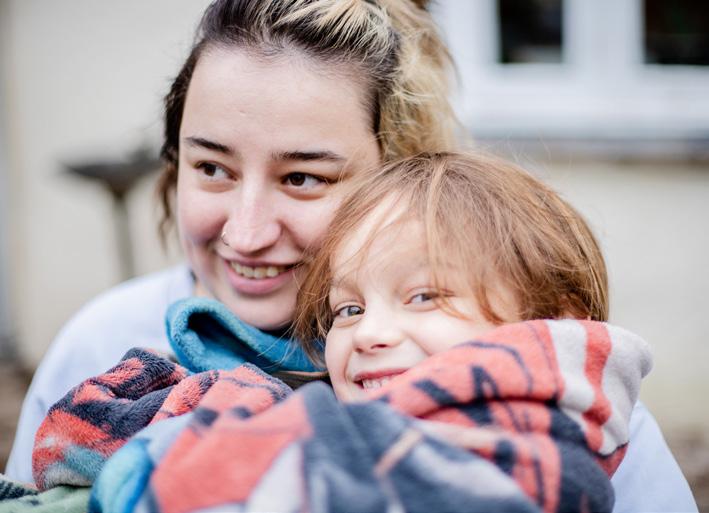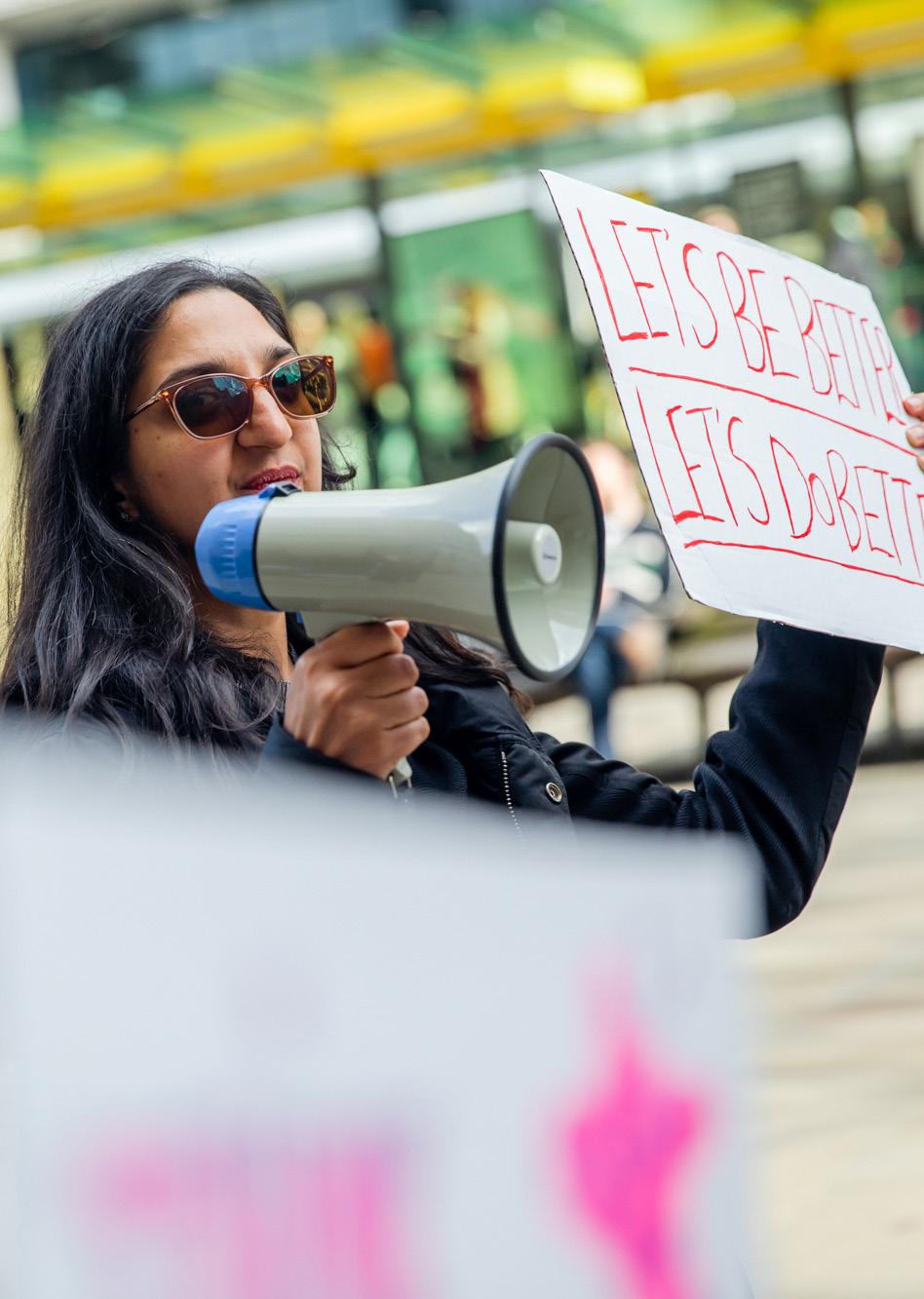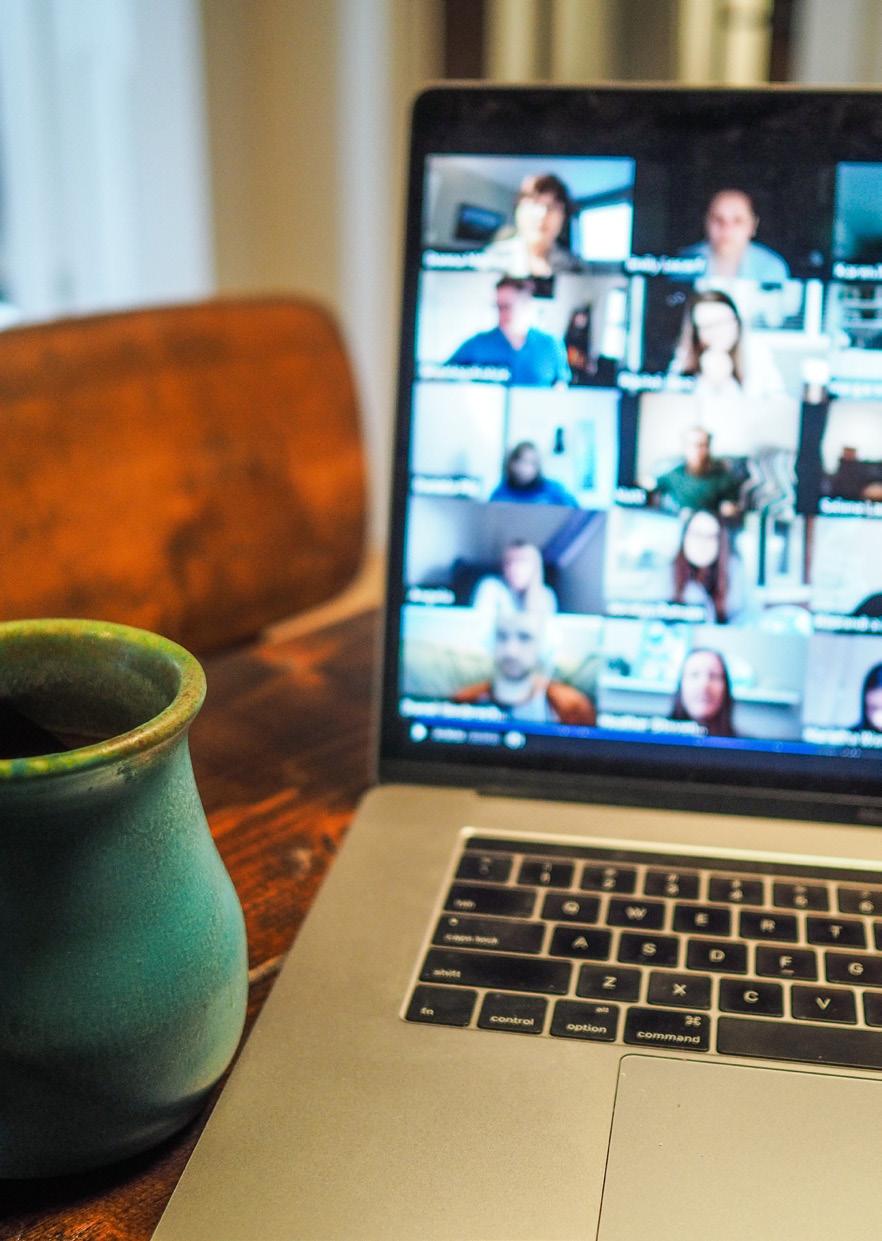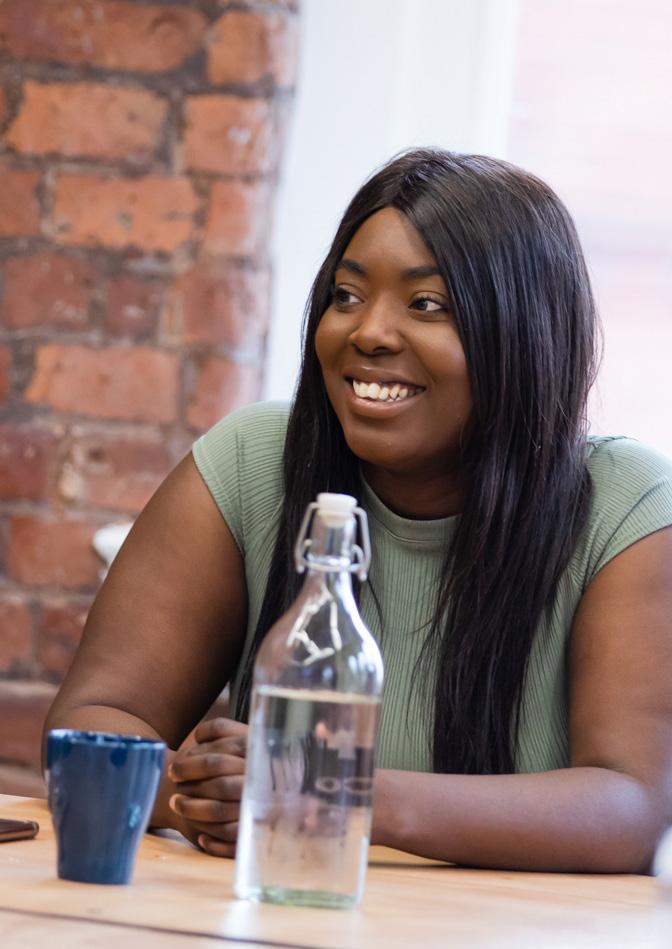Making it easier to ask for help





Manchester Mind believes in the power of listening and being heard.
Tackling/challenging inequality, promoting social justice and supporting people to access their rights and entitlements is a crucial part of our history, our present and our future. Over the years a lot has changed with regard to how we view mental health – it has a much higher profile and people are more comfortable talking about it. However, we know from people’s experiences that services and support are harder to find and to access. We want to contribute to making that easier, so that people are able to get the help and support that they need at the time they need it. This plan will help us do that.
Our key strategic focus is on people – who work and volunteer for us – they are the people that make things happen.
The last few years have taken their toll on all of us but in different ways. During the pandemic we did our best, like many others in our sector, to keep things going. We did that and more - we grew and adapted to different ways of working. At the same time, more people were asking for help and what they wanted help with was often more complex.
Everyone was affected by the events of the last few years, but those from already minoritised communities, those with existing health issues and dealing with the impact of poverty and deprivation have been most affected.

As a charity working to support and alleviate the impact of poor mental health we need to ensure that Manchester Mind is resilient enough and has the staff with the values, experiences and skills to be at the forefront of what we do. We have excellent staff and volunteers , and we want to make sure we are an organisation people want to work for, where they feel safe and able to develop.
We want to build on our whole person approach as we know that things work better when we recognise and build on connections, such as between mental and physical health, and with practical stressors such as poor housing, debt, isolation and loneliness. We also want to influence more, as a way of bringing about change. We want to support people with lived experience amplify their voices. Finally, underpinning our work is a focus on governance and financial sustainability.
This strategy will be our guide over the next three years.
Elizabeth Simpson, CEO Rachel Pearson, ChairThe environment we are working in is constantly changing and life is difficult for many people. We believe that our current whole person approach to delivering connected services makes a difference, but we want to do more and we want to do it better - making it easier for people to ask for and receive help. We have a lot to do.
We have spoken to many people during the past 12 months about their experiences of using services and what would help, and the key theme that comes across is that people find it difficult to get help. That can be because the thresholds for services are too high; or the waiting times are too long; or people don’t feel understood and don’t feel listened to; or there is no clear explanation of what they could do or where they can go. The reasons are many. It is frustrating and it means that often people do not get the help they need at the point they need it, and we know that the sooner a person does get help the better the outcome.


It can feel scary and uncomfortable but asking for help can be the start of the journey to sort things out and make things better – there are lots of things that can get in the way, such as:

What we hear is that people want to be listened to before forms are filled in or boxes ticked. They do not want to go to one place and be passed on to somewhere else. They want and need a destination where they are listened to and heard, with support provided. People want to feel safe and treated as if they belong.
• Too much going on in our lives making it difficult to decide what to do and where to go
• Services gatekeeping, making it complicated to access them
• There are so many hurdles before you can access the support
• Fear of being judged or belittled
• Support is only short-term, so it doesn’t feel worth it
• Fear of not being listened to
• When is the right time?
• We have tried before and it didn’t work - sometimes it makes things worse
• Fear of people saying “no” and that’s another chance missed
We want Manchester Mind to be that place.
Manchester Mind has been supporting mental health in Manchester since 1989. We have a focus on the social determinants of mental health and delivering our services in a way that alleviates the pressures of the key risk factors around mental health.

Our current services include:
• Advice: benefits, debt and housing
• Children and Young People’s services (CYP): peer Support, support in schools, advice and counselling
• Mental health support sessions
• Green wellbeing
• Adult counselling
• Peer support
• Community engagement support with people being discharged from community mental health teams
• Improving access to physical health checks
• Staff supporting the delivery of services within community mental health teams
• Family intervention work
• Community training and support - including for people with long term conditions and people experiencing menopause and perinatal mental health issues
We also deliver a wide package of training to employers and work with businesses as part of our fundraising
Strategic Plan: 2023 – 2026
We believe in working in partnership, by doing so we can increase our reach and access to support. Currently the areas in which we are working in partnership include:
80% of the people that come to Manchester Mind are aged between 18 and 57 years of age. We are working with a significant number of young people under 18 through our CYP service and the work we do in schools.
• Advice
• Volunteering
• Improving access to physical health checks
• Delivering support in schools
• Family intervention work
• Supporting young people leaving care in Manchester
• Designing new mental health support in Manchester
45% of the people we work with come from racialised communities. The majority of people are not in work and are dependent on benefits.
This matches what we know about mental health – if you experience poverty or other types of inequality you are more likely to experience a mental health problem and have experienced trauma and discrimination.
90% of the people we have been working with experience inequality. The majority of people initially access our services through our telephones or through our website.
There is lots of change on top of lots of change! It is simply exhausting to keep track of and also to experience. Over the last three years there has been the pandemic, the impact of which is still being felt; we are in the middle of a cost of living crisis, following over 10 years of austerity, which had seen under investment in services across the board. There is currently the establishment of Integrated Care Boards, which will see a change in the way the NHS works in communities and in commissioning. For many reasons, including lack of investment and a current workforce crisis, our systems are struggling and in some cases are broken. This is the case with mental health services. This means that people are finding it difficult to get help that is consistent – this is vital for people.

Our purpose is to create a space where mental health comes first
We believe...
• In the power of listening and feeling heard
• Everyone has value, something to offer
• Everyone deserves to be supported in their mental health needs and we have a part to play in that
• A better understanding of mental health, both personally and professionally, benefits everyone
• Being open to learning and reflecting on experience can improve mental health services: there is no single “right way”
We value...

Being receptive to, and appreciative of, the skills, talents and perspectives of everyone
Developing kind relationships that lead to feeling accepted, understood and able to contribute
Recognising and developing potential in others and ourselves, enabling resilience
Generous sharing of our resources, skills and talents enabled by clear and meaningful communication
We have one big ambition over the next three years – Making it easier to ask for help
1.

To ensure we can do this, we have four areas of focus: 2. 3. 4.
Sustaining and developing our whole person approach Strengthening our influence and voice Being well run and sustainable
Strategic Plan: 2023 – 2026


Asking for help, as we have noted, is often difficult. We want to make sure that when people come to Manchester Mind and ask for help, that we have services available that are accessible, warm, welcoming and relational, and delivered safely and consistently. We need to be able to start from where the person is and understand and/or be able to listen to their story in a way that people feel heard.

We have a hugely experienced and skilled team of staff and volunteers, who make things happen, deliver services and ensure the organisation is sustainable and governed effectively. The last 3 years, on top of the previous 10 years of austerity, has had an impact on our work – it is tougher to find solutions with people and if we can it probably takes longer. Burnout for staff is real and we need to be more explicit about our commitment to staff wellbeing and self-care.
We want to ensure that people working and volunteering for Manchester Mind feel valued and appreciated, and alongside this have the skills and opportunities for continued development.
We want staff and volunteers to feel able to contribute and speak out if things do not look or feel right.

Peer support volunteer contributing to what helps in a strategy consultation
Strategic Plan: 2023 – 2026
“I like the way Manchester Mind thinks about how we welcome people”
• Focus on creating a psychologically safe workplace for our staff and volunteers
• Our staff and volunteers will have access and contribute to an improved learning and development programme
• Co-produce a wellbeing programme for staff and volunteers

Strategic Plan: 2023 – 2026

Everything is connected, whether that is in terms of psychological, biological, social aspects of a person and a person’s physical environment
The support people need is also connected; it is rarely just one thing. Internally, the services we provide are connected and overlap. People tell us it is often hard to get all the support they need in one place or that physical needs are often usurped by mental health issues or vice versa, and for many, social factors are not dealt with at all.

Our current range of services do address some of these needs and we have found that we still have gaps, which include doing more work around developing physical activity, advice for young people, and advice to help with debts.
We are also noticing that more people are accessing our support who are in or on the edge of crisis.
Our current experience also tells us that some of our services, such as advice, our support sessions and counselling, are oversubscribed with rising demand and we will need to think about how we address this.
Connecting our own services is also vital in this area.
What helps is when people talk to each other, we use the power of the group/collective, in supporting the people we work with.
Therefore, the people who use our services benefit not just from one person they see but they tap into a much bigger support system within Manchester Mind. This helps people know what is out there so they know what they are entitled to, and that they are worthy of help and respect.
“All this incredible support was available to me at the end of just one phone call, and I was not even aware of it. All I had to do was make that one call rather than suffer the pain. I am shocked at the amount of support I have been linked in to. I would encourage others to reach out for help”A person supported through our telephone listening ear service
• Ensure that all our services offer safety, choice, collaboration, trust, empowerment and are accessible to all members of our community
• We have services whose funding will be coming to an end and therefore we will be working to maintain current provision
• Commit to trying to fill gaps in our service model, particularly around physical activity, improved access to advice, working with people in crisis - part of this will be about working collaboratively with others


Our ambition is to be braver, more outspoken and to make the most of our experience and knowledge. To extend our influence and also support people to use their voice and experiences to strengthen service design, approaches to delivery and challenge stigma, discrimination and lack of inclusivity.


• Be active in the spaces where influencing takes place locally, regionally and nationally

• Support and enable people with lived experience of mental health issues to influence the planning, development and delivery of mental health services
• Challenge stigma and discrimination wherever we see and hear it
Strategic Plan: 2023 – 2026


Our objective is to be an organisation that asks difficult questions, not just externally but internally – how are we doing? Are we living up to our high standards? Are we developing and aligning with best practice on everything we do? Are we doing as much as we can to alleviate climate change and are we sustainable and investing our income in the right things? We need to have an eye on all these areas as they underpin our ability to deliver.

• Invest to ensure that we have the capacity to develop and run our services in a way that is traumainformed - offering safety and choice
• Ensure we have enough income to sustain and develop our services
• Our governance will reflect the development of this strategy through encapsulating a traumainformed approach and ensure that our organisation reflects our local communities

Strategic Plan: 2023 – 2026

Our annual business plans will focus on our objectives. They will be fully costed, reflecting our priorities and operational delivery plans.
Our staff and volunteers will report improvements in their wellbeing and feeling supported by Manchester Mind, and they will have had access to a training and awareness that they have helped design. They will be recognised for raising awareness, and challenging stigma and discrimination in mental health.

We can track the journey of the people who use our services, so we are confident in being able to demonstrate how a whole person, trauma-informed approach, delivered by committed staff and volunteers, can be the blueprint for mental health support in the community.
Which is recognised locally for the quality of our support and innovative ways of working that reflect the voices of Manchester residents. We will have supported and enabled people to be involved and influence the planning and delivery of mental health services locally, regionally and nationally.
Always asking the difficult questions. We will have balanced robust planning and financial management, with new opportunities and being innovative in the delivery of services.
We will have engaged with more people, and offered them more support in each of the following 3 years.
Strategic Plan: 2023 – 2026

When people do come to us and ask for help - we need to value and respect it and understand what the journey to this point might have been.
This is our focus, and with this we can understand more, be curious, be able to help at an earlier stage, ensure we are better at meeting needs, understand more about the gaps, and learn when we get things wrong. We can use our influence to make that journey easier and enable people to have a stronger voice in influencing systems.
But also complicated. There are a lot of moving parts. Our focus and commitment on people, a whole person approach, extending our influence and being well run will help keep our focus.
Person attending mental health support session, talking about what helps

“Being given the space to be listened to and feel vulnerable, not many services do that”
